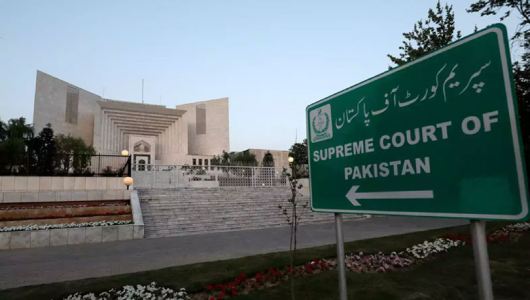ISLAMABAD: A five-member Supreme Court (SC) bench on Monday declared the military trials of civilians arrested in the wake of violent protests in the country on May 9 to be null and void.
The court announced the brief verdict in the case, which was reserved earlier in the day. Justice Ijazul Ahsan led the bench, which included Justices Munib Akhtar, Yayha Afridi, Sayyed Mazahar Ali Akbar Naqvi, and Ayesha A. Malik.
A six-judge bench, previously including former chief justice of Pakistan (CJP) Umar Ata Bandial, had been hearing the petitions since June. However, after Justice Bandial’s retirement, the bench was reduced to five judges.
On Sunday, at least nine accused facing trials under the Army Act moved the apex court for an early conclusion of their cases by the military courts. In separate applications, the suspects pleaded that they had complete faith and confidence in the military authorities to provide justice to them and to other accused persons.
Following the violence on May 9, which targeted civilian and military installations, a total of 102 persons were taken into custody for their involvement in the attacks on military establishments, including the General Headquarters in Rawalpindi, corps commander’s residence in Lahore, PAF Base Mianwali, and an office of the Inter-Services Intelligence (ISI) in Faisalabad.
At the outset of today’s hearing, Attorney General for Pakistan (AGP) Mansoor Usman Awan approached the rostrum and said that he would present arguments on why a constitutional amendment was not required in this case.
“A trial in military courts fulfills all the requirements of criminal courts,” he said. He said that the military trials of civilians had formally begun. He added that the verdicts issued by the military courts would also provide detailed reasoning.
The AGP said that a matter concerning an attack on a restricted area or building could also be referred to military courts.
At one point, Justice Ahsan asked, “A constitutional amendment was required to try terrorists but not for civilians? I am trying to understand your argument.”
AGP Awan said that if the accused had a “direct link” to the armed forces, then a constitutional amendment was not required. He said that the suspects would be tried under Section 2(1)(d)(ii) of the Official Secrets Act.
He then noted that the court had raised a question about the framing of charges against the suspects. “All the requirements of a criminal case will be met in the trial under the Army Act,” he said.
He further stated that the trial of May 9 suspects would be similar to how it is conducted in criminal courts. “The reasoning will be provided in the verdict, and the evidence will be recorded,” Awan said.
He said all the requirements for a fair trial under Article 10-A (right to a fair trial) of the Constitution would be met. He added that appeals against the verdict could also be filed in the high courts and subsequently the apex court.
During the hearing, Justice Ahsan asked about those who had been tried by military courts in the past. “Were the accused in 2015 civilians, foreigners, or terrorists?” he asked.
The AGP replied that the suspects included both nationals and foreigners. He said that those tried in 2015 also included those who facilitated terrorists.
Justice Ayesha also asked the AGP how he would connect his arguments with Article 8(3) of the Constitution. “According to the law, a link to the armed forces is necessary [for trial in military courts],” she said.
Justice Ahsan remarked that the Constitution protected the fundamental rights of citizens.
(Islamabad51_Newsdesk)














